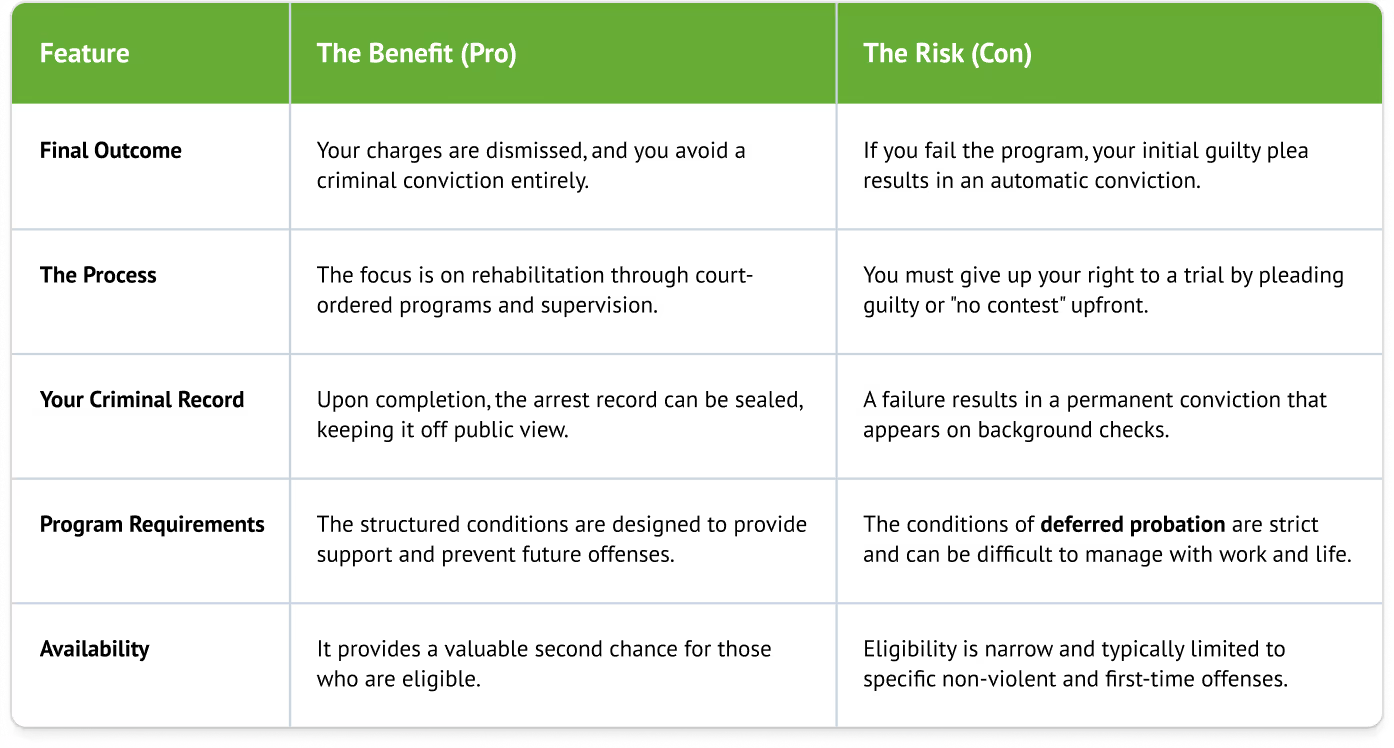Certain opportunities in the justice system promote personal growth and rehabilitation over simple punishment. A deferred sentence is a primary example of this constructive approach, offering an alternative to a standard conviction.
Investigating the pros and cons of deferred judgment in California is a critical first step for anyone considering this option, as it involves understanding a specific legal tool that can lead to a profoundly different outcome in your case.
This blog is for individuals who want to understand the practical details of a deferred prosecution and what it entails.
We will answer the common question, "What does a deferred sentence mean?" and clarify how this process works.
Our goal is to provide a balanced overview of deferred entry of judgment, helping you see the full picture of responsibilities and benefits before you proceed.
Key Takeaways
- A deferred judgment allows you to avoid a criminal conviction after completing a probationary period.
- You are required to plead "guilty" or "no contest" at the beginning, which is a risk if you cannot meet the program's terms.
- Successful completion leads to the dismissal of charges and a sealed record for most purposes.
- Eligibility is specific and usually applies to non-violent, first-time offenses.
What is a Deferred Judgment?
It is a special deal where you say you are guilty or do not contest a charge. However, the court does not officially record a conviction.
Instead, the court postpones further proceedings and places you on probation with certain conditions. This deferred conviction approach gives you the chance to prove you can meet the court’s requirements.
If you complete all probationary conditions, the court will dismiss your case.
At that point, you can legally and honestly claim not to be guilty of the crime. The meaning of deferred judgment is about getting a fresh start. This is possible if you keep your part of the agreement.
Who is Eligible for Deferred Judgment in California?
Eligibility is a crucial factor. In California, deferred entry of judgment is most commonly available for first-time, non-violent drug offenses.
The court looks at both the charge and your history to determine if you qualify. While every case is different, the general eligibility requirements include:
- You must have no prior convictions for drug-related crimes.
- You must not have any felony convictions within five years of the current offense.
- The current offence must not involve any violence or threats of violence.
- You cannot fail probation or parole.
- You have not previously participated in a deferred judgment program.
The Pros and Cons of Deferred Judgment in California
Making an informed decision requires weighing the benefits against the risks. Here is a direct comparison of what a deferred judgment offers.

Meeting Court-Ordered Requirements with CT3 Training & Rehab
Many people in a deferred judgment program must complete counseling, rehabilitation, and training as part of their court orders. Navigating these requirements is a key part of completing probation.
Organizations like CT3 Training & Rehab offer certified programs. These programs meet judicial standards and provide real support for personal change.
CT3 Training & Rehab offers helpful programs that meet court requirements for substance abuse, anger management, and other behavioral needs. Their certified professionals create a supportive environment to help you fulfill your obligations and develop positive life skills.
Finishing these programs is not just about checking a box. Building a brighter future and ensuring you complete your deferment phase is important.
If you are starting a deferred entry of judgment program, you need to meet court-ordered requirements. Acting is the next step.
Contact CT3 Training & Rehab today. Learn about their certified programs and get the support you need to succeed.
.avif)


